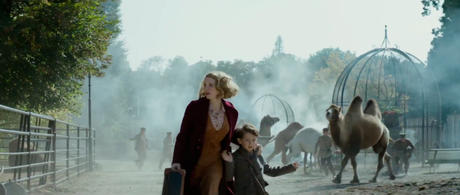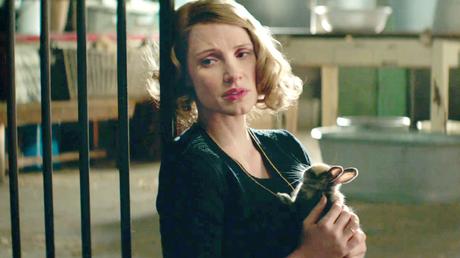
I rolled my eyes the first time I saw the trailer for Zookeeper's Wife. Jessica Chastain in a fact-based WWII movie about a female Oscar Schindler? Ugh. Talk about Oscar bait. And exactly how many WWII movies does the world need?
I was partially driven to such a response because the first time I saw the trailer was late last year when it came attached to another Jessica Chastain Oscar hopeful, the criminally overlooked gun control drama Miss Sloane. But, also, I'm just cynical like that.
What a difference a couple of months can make. The Oscar season is far behind us, meaning Zookeeper's Wife doesn't have to be judged on whether or not it should win any awards. Plus, the sad need to re-learn the lessons of WWII seems all the more pressing since nearly the entire western world is currently caught in a toxic wave of xenophobic nationalism. So, gather around to hear the tale of what two brave people in Poland did when the whole world went crazy and started treating a certain subset of the human population like animals. Perhaps you'll walk away from the story feeling better about the power of the human spirit, even if plenty of Neo-nazis and holocaust deniers are still walking the Earth preaching ignorance and hate.
The facts are these: Prior to WWII, Jan and Antonina Zabinski oversaw the Warsaw Zoo in Poland, one of the biggest zoos in Europe at the time. When Germany seized Poland, the Warsaw Zoo was greatly damaged by the bombing raids. Those animals which survived were either claimed by Hitler's chief zoologist Lutz Heck for genetic breeding purposes, transported back to German zoos or outright killed for sport and meat for the soldiers. This callous treatment of the animals was a preview of what was to come for the city's Jews. With their livelihood ruined and moral outrage probably stoked, Jan and Antonina turned the Zoo into a pig farm as a cover for what they were really up to: hiding and transporting Jews out of the city.
We see all of this in the film in a lushly photographed, impeccably acted, but remarkably straight-forward fashion, with Johan Heldenbergh, Jessica Chastain and Daniel Bruhl playing Jan, Antonina and Heck respectively. The primary tension is whether or not they will get caught, particularly as Heck continues sniffing around, having fallen in love with a secretly repulsed Antonina and using the Zoo as a staging ground for his breeding experiments. Just how evil will this Nazi zoologist turn out to be? Is there any possible way that Jan, Antonina and their two children can all survive the ordeal? To say anything further would be spoiling the tense, cinematic joy of the film, even though the answer is a part of the historical record and thus easily Google-able.
What we have is a movie about a group of people who naturally preferred animals to people stepping up to do the right thing at considerable personal risk when their friends and neighbors were suddenly treated worse than your average zoo animal, first rounded up and put in ghettos and then herded into trains and sent off to death camps. It's WWII from the point of view of animal-loving folk who, by a happenstance of geography, got the world's first look at the Nazi's cruelty and met it head-on with cunningness and steady compassion.

I wanted to be more cynical about it or at least more critical. Surely the zoo animals=Jews metaphor is too heavy-handed, and it is awfully jarring when Antonina's son changes into a completely different actor without warning as the years progress and he gets older. But then something would happen to put me on the edge of my seat ("oh no, are they going to get caught now?"), and I realized the film had me in the palm of its hand.
THE BOTTOM LINEUnquestionably, the Zabinskis' life story deserved to be told, and any film doing so could have easily coasted by on the impressiveness of the true history. However, Zookeeper's Wif e tells what is ultimately a simple historical tale in a truly beautiful way. Oscar bait or not, movies like this will continue to be made for as long as the world needs to be reminded of the way WWII brought out both the best and worst in humanity.
ROTTENTOMATOES CONSENSUS

